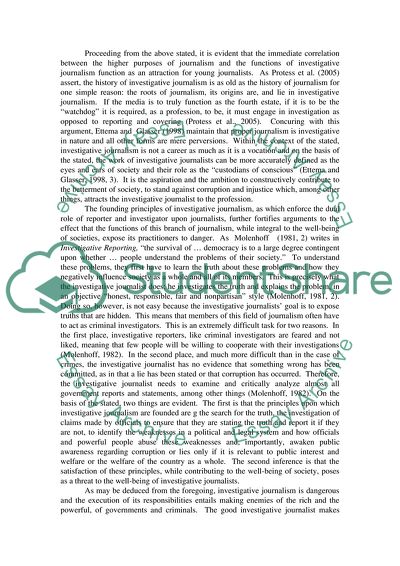Cite this document
(“Each year investigative journalists are murdered and yet newcomers are Essay”, n.d.)
Each year investigative journalists are murdered and yet newcomers are Essay. Retrieved from https://studentshare.org/miscellaneous/1540886-each-year-investigative-journalists-are-murdered-and-yet-newcomers-are-prepared-to-join-the-ranks-using-examples-and-autobiographical-material-discuss-what-it-is-that-drives-such-men-and-women-despite-an-apparent-decline-in-support-from-their-employers
Each year investigative journalists are murdered and yet newcomers are Essay. Retrieved from https://studentshare.org/miscellaneous/1540886-each-year-investigative-journalists-are-murdered-and-yet-newcomers-are-prepared-to-join-the-ranks-using-examples-and-autobiographical-material-discuss-what-it-is-that-drives-such-men-and-women-despite-an-apparent-decline-in-support-from-their-employers
(Each Year Investigative Journalists Are Murdered and Yet Newcomers Are Essay)
Each Year Investigative Journalists Are Murdered and Yet Newcomers Are Essay. https://studentshare.org/miscellaneous/1540886-each-year-investigative-journalists-are-murdered-and-yet-newcomers-are-prepared-to-join-the-ranks-using-examples-and-autobiographical-material-discuss-what-it-is-that-drives-such-men-and-women-despite-an-apparent-decline-in-support-from-their-employers.
Each Year Investigative Journalists Are Murdered and Yet Newcomers Are Essay. https://studentshare.org/miscellaneous/1540886-each-year-investigative-journalists-are-murdered-and-yet-newcomers-are-prepared-to-join-the-ranks-using-examples-and-autobiographical-material-discuss-what-it-is-that-drives-such-men-and-women-despite-an-apparent-decline-in-support-from-their-employers.
“Each Year Investigative Journalists Are Murdered and Yet Newcomers Are Essay”, n.d. https://studentshare.org/miscellaneous/1540886-each-year-investigative-journalists-are-murdered-and-yet-newcomers-are-prepared-to-join-the-ranks-using-examples-and-autobiographical-material-discuss-what-it-is-that-drives-such-men-and-women-despite-an-apparent-decline-in-support-from-their-employers.


